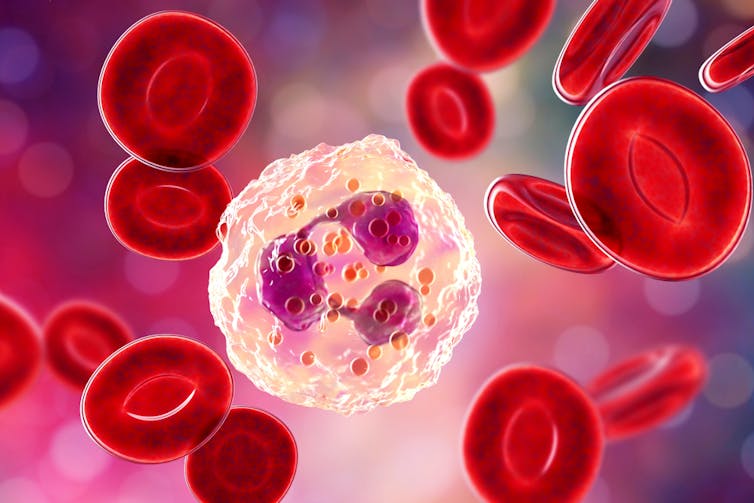Why do kids tend to have milder COVID? This new study gives us a clue
- Written by Joanna Groom, Laboratory Head, Walter and Eliza Hall Institute
A new Australian study, published overnight in Nature Communications, gives an insight into how kids’ immune systems respond to infection with SARS-CoV-2, the virus that causes COVID-19.
It’s the first study, to my knowledge, that directly compares children and adults with mild COVID.
Children are less likely to become infected, and when they are, they are more likely to be asymptomatic. This is in contrast to other viral and respiratory infections that are more prevalent among young people.
This new research helps explain how kids’ immune systems work when confronted with the coronavirus — and gives us clues as to why they generally seem to fare better than adults.
Read more: Worried about your child getting coronavirus? Here's what you need to know
The kids (immune systems) are alright
The researchers studied 48 kids, mostly in primary school, across 28 households during Melbourne’s second wave. All children were exposed to the coronavirus in their households by infected parents.
This study focused on the “innate” immune response in children, which forms the early part of the immune system’s attack on a virus (or bacteria, or other pathogens). The innate immune system plays an important role in viral protection before the body raises antibodies.
The study found there were dynamic changes in kids’ early immune responses, compared with coronavirus-infected adults.
Read more: Explainer: what is the immune system?
One key innate immune cell that was elevated in children exposed to the virus was a type of white blood cell called “neutrophils”. These cells patrol the body for infections. When they discover a pathogen, they have a unique ability to respond by trapping and killing the invading pathogen (in this case, the coronavirus).
This role may ensure the virus is not able to infect more cells. This potentially decreases the “viral load”, basically the amount of virus in your body.
 The researchers looked at neutrophils, a type of white blood cell.
from www.shutterstock.com
The researchers looked at neutrophils, a type of white blood cell.
from www.shutterstock.com
For some of the kids in the study, the early immune responses kept the viral load so low that they never returned a positive test, despite being tested throughout the study and having been exposed to coronavirus.
One strength of this study is that it was “longitudinal”, meaning it studied families over time, rather than simply at one point in time. The researchers looked at immune responses of the families just after their exposure to the virus, and returned more than 30 days later to see what had changed. This allowed them to identify the key changes induced because of the exposure to the virus.
Kids vs adults
A key question arising from this research is: why did the kids show such strong immune responses, resulting in few or no symptoms, while their parents were very ill?
It’s a difficult question to answer, at least so far. But the key differences in responses are likely to lie in the early responses of the immune system.
There is some previous research that might give some clues.
One theory surrounds the fact that children have less of the receptors called “ACE2” in their respiratory tract. These receptors are the pathway of entry for the virus into our cells. In theory, less ACE2 receptors mean less chance for the virus to break in and infect our cells. Virus’ don’t survive for very long outside a cell. With less ACE2 receptors, it may give more time for the innate immune cells to control the virus as much as it can while waiting for other immune cells to come along and help.
Read more: ACE2: the molecule that helps coronavirus invade your cells
Another possibility relates to “interferons”, which are alert signals released by cells to tell the body there’s a virus around. Researchers think higher levels of interferons during the early phase of an infection are very important for controlling coronavirus. Potentially, interferons may help promote the increased neutrophils that were seen in children, compared with lower numbers observed in adults.
The wide range of symptoms in COVID are intriguing and frustrating at the same time. Conventional wisdom was that kids are more prone to getting sick with respiratory illnesses than adults — just ask any parent! But with COVID it seems to be the opposite.
Often when we think we’ve nailed down a specific mechanism as to how this new virus works and how our bodies respond to it, it turns out such a mechanism is different across different people. We can see this in the huge range of symptoms that different people display — some get a runny nose, others get a cough, and others suffer extreme exhaustion and respiratory distress or develop “long COVID”, in which symptoms drag on for months.
Coronavirus is still keeping immunologists on their toes. Studies like this one help solve some of the puzzle in understanding who’s at most at risk of severe disease and why.
Read more: Five life lessons from your immune system
Authors: Joanna Groom, Laboratory Head, Walter and Eliza Hall Institute




